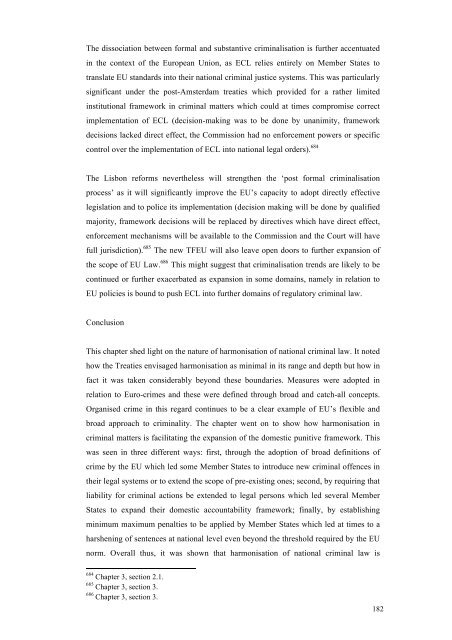The evolution of European Union criminal law (1957-2012)
The evolution of European Union criminal law (1957-2012)
The evolution of European Union criminal law (1957-2012)
Create successful ePaper yourself
Turn your PDF publications into a flip-book with our unique Google optimized e-Paper software.
<strong>The</strong> dissociation between formal and substantive <strong>criminal</strong>isation is further accentuated<br />
in the context <strong>of</strong> the <strong>European</strong> <strong>Union</strong>, as ECL relies entirely on Member States to<br />
translate EU standards into their national <strong>criminal</strong> justice systems. This was particularly<br />
significant under the post-Amsterdam treaties which provided for a rather limited<br />
institutional framework in <strong>criminal</strong> matters which could at times compromise correct<br />
implementation <strong>of</strong> ECL (decision-making was to be done by unanimity, framework<br />
decisions lacked direct effect, the Commission had no enforcement powers or specific<br />
control over the implementation <strong>of</strong> ECL into national legal orders). 684<br />
<strong>The</strong> Lisbon reforms nevertheless will strengthen the ‘post formal <strong>criminal</strong>isation<br />
process’ as it will significantly improve the EU’s capacity to adopt directly effective<br />
legislation and to police its implementation (decision making will be done by qualified<br />
majority, framework decisions will be replaced by directives which have direct effect,<br />
enforcement mechanisms will be available to the Commission and the Court will have<br />
full jurisdiction). 685 <strong>The</strong> new TFEU will also leave open doors to further expansion <strong>of</strong><br />
the scope <strong>of</strong> EU Law. 686 This might suggest that <strong>criminal</strong>isation trends are likely to be<br />
continued or further exacerbated as expansion in some domains, namely in relation to<br />
EU policies is bound to push ECL into further domains <strong>of</strong> regulatory <strong>criminal</strong> <strong>law</strong>.<br />
Conclusion<br />
This chapter shed light on the nature <strong>of</strong> harmonisation <strong>of</strong> national <strong>criminal</strong> <strong>law</strong>. It noted<br />
how the Treaties envisaged harmonisation as minimal in its range and depth but how in<br />
fact it was taken considerably beyond these boundaries. Measures were adopted in<br />
relation to Euro-crimes and these were defined through broad and catch-all concepts.<br />
Organised crime in this regard continues to be a clear example <strong>of</strong> EU’s flexible and<br />
broad approach to <strong>criminal</strong>ity. <strong>The</strong> chapter went on to show how harmonisation in<br />
<strong>criminal</strong> matters is facilitating the expansion <strong>of</strong> the domestic punitive framework. This<br />
was seen in three different ways: first, through the adoption <strong>of</strong> broad definitions <strong>of</strong><br />
crime by the EU which led some Member States to introduce new <strong>criminal</strong> <strong>of</strong>fences in<br />
their legal systems or to extend the scope <strong>of</strong> pre-existing ones; second, by requiring that<br />
liability for <strong>criminal</strong> actions be extended to legal persons which led several Member<br />
States to expand their domestic accountability framework; finally, by establishing<br />
minimum maximum penalties to be applied by Member States which led at times to a<br />
harshening <strong>of</strong> sentences at national level even beyond the threshold required by the EU<br />
norm. Overall thus, it was shown that harmonisation <strong>of</strong> national <strong>criminal</strong> <strong>law</strong> is<br />
684 Chapter 3, section 2.1.<br />
685 Chapter 3, section 3.<br />
686 Chapter 3, section 3.<br />
182
















